
April 27
1791 Birth: Samuel Morse:
Morse had many talents, and in 1832 he became one of several people interested in finding ways of communicating by sending electrical impulses across a wire — a concept which became known as the telegraph. Morse developed a dot-and-dash alphabet and devised a practical plan for using telegraphy to send messages across great distances. Morse demonstrated a working model in 1837, and by 1843 had secured government funding to run a line from Baltimore, Maryland to Washington, D.C. On May 24, 1844 he transmitted the first telegraph message: "What hath God wrought!" Although he spent years in legal wrangles over telegraph patents, he was finally rewarded for his efforts and lived his later years as a wealthy man . . . .
The emergency call SOS‑-dot-dot-dot, dash-dash-dash, dot-dot-dot‑-is a famous Morse code combination.
1805 North Africa: To the shores of Tripoli:
After marching 500 miles from Egypt, U.S. agent William Eaton leads a small force of U.S. Marines and Berber mercenaries against the Tripolitan port city of Derna. The Marines and Berbers were on a mission to depose Yusuf Karamanli, the ruling pasha of Tripoli, who had seized power from his brother, Hamet Karamanli, a pasha who was sympathetic to the United States.
The First Barbary War had begun four years earlier, when U.S. President Thomas Jefferson ordered U.S. Navy vessels to the Mediterranean Sea in protest of continuing raids against U.S. ships by pirates from the Barbary states—Morocco, Algeria, Tunis, and Tripolitania. American sailors were often abducted along with the captured booty and ransomed back to the United States at an exorbitant price. After two years of minor confrontations, sustained action began in June 1803, when a small U.S. expeditionary force attacked Tripoli harbor in present-day Libya.
In April 1805, a major American victory came during the Derna campaign, which was undertaken by U.S. land forces in North Africa. Supported by the heavy guns of the USS Argus and the USS Hornet, Marines and Arab mercenaries under William Eaton captured Derna and deposed Yusuf Karamanli. Lieutenant Presley O' Bannon, commanding the Marines, performed so heroically in the battle that Hamet Karamanli presented him with an elaborately designed sword that now serves as the pattern for the swords carried by Marine officers. The phrase "to the shores of Tripoli," from the official song of the U.S. Marine Corps, also has its origins in the Derna campaign.
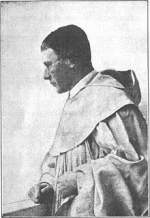
1899 Volkishness: Father Georg (Adolf Josef Lanz) renounces his holy vows and leaves Heiligenkreuz Abbey. The abbey register refers to his leaving as a "surrender to the lies of the world and carnal love." (THP) Note: Lanz was a Defrocked Cistercian monk, con-man (doctor, baron) and race-fanatic whose writings had a great influence on both Hitler and Eckart. In 1900, Lanz founded an anti-Semitic lodge known as the "Order of the New Temple" and set himself up as grandmaster. Its symbol, chosen by Lanz himself, was the Swastika. Lanz's magazine "Ostara" became extremely popular for a time in Vienna and throughout the German speaking world. Lanz and Hitler met in Vienna sometime in 1908-1909 (possibly earlier when Lanz visited Lambach in late 1890's). Several books by Lanz were found in Hitler's library when it was seized by the Allies at the end of the war.

1915 World War I: List Regiment: Gefreiter Adolf Hitler's 16 Reserve Infantry Regiment occupy a position, at Fromelles (pictured above in a drawing by Hitler), which is on a level field with water channels, willow trees and willow stalks, in the distance towards the enemy lines lie an insignificant wood with barbed wire entanglements. Under the direction of their defense-minded commander, Lieutenant General Gustav Scanzoni von Lichtenfels, the regiment works ceaselessly day and night in the subsequent weeks, to further fortify their position at Fromelles. [For further details, Click here.]
1916 World War I: Various:
British attempt to bargain with Turks over Kut:
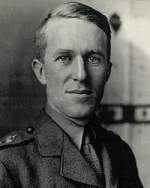
Three British officers, including the famous Captain T.E. Lawrence (known as Lawrence of Arabia), attempt to engineer the escape of thousands of British troops under siege at the city of Kut-al-Amara in Mesopotamia through a secret negotiation with the Turkish command. [For further details, Click here]
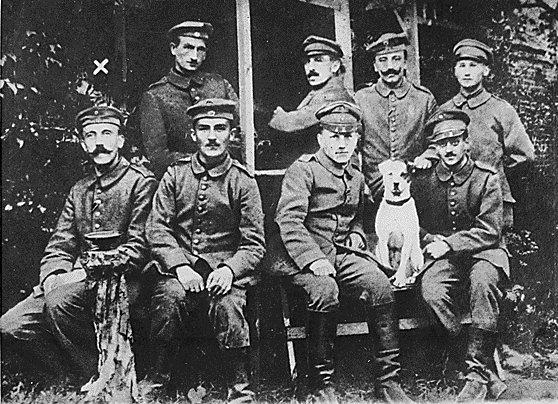
List Regiment: Gefreiter Adolf Hitler endures trench warfare in Flanders (Artois) with 3 Company, 16 Reserve Infantry Regiment. [For further details, Click here.]
1917 World War I: List Regiment: Gefreiter Adolf Hitler's 16 Reserve Infantry Regiment, 3 Company, participate in the Arras action, being redeployed east of Vimy Ridge. [For further details, Click here.]
A later Hitler reminiscence: At the battle of Arras, the situation was such that the Richthofen Squadron was able to clear the sky of all enemy aircraft. I myself witnessed part of an engagement in which the last remnants of a formation of ten aircraft were shot down. We had the sky to ourselves.
[See: Was Adolf Hitler a 'War Hero' in World War I?]1918 World War I: List Regiment: Gefreiter Adolf Hitler's 16th RIR constructs fortified works in difficult defensive positions on an active front with German assault regiments near Fountaine (Montdidier). [For further details, Click here.]
1919 According to Hitler, in Mein Kampf, three Red Guards come to the List Regiment barracks early in the morning to arrest him, but are dissuaded when they discovered the decorated Gefreiter armed with a loaded carbine. There is no other confirmation of this story either, which is found only in Mein Kampf. Although Schmidt had returned to civilian life, he was still in contact with Hitler. If the incident happened as Hitler later claimed, he would not have failed to inform Schmidt of all the details. It is therefore noteworthy that Schmidt did not hear of the incident, a fact that casts grave doubt upon this unsubstantiated tale.
[For further details, Click here.]
1920 For the first time in public, Hitler proclaims "We need a dictator who is a genius, if we want to rise again . . . . As soon as we assume power, then we will work like buffaloes." He doesn't say whether or not he has someone specific in mind for the job of genius-dictator.
[For further details, Click here.]
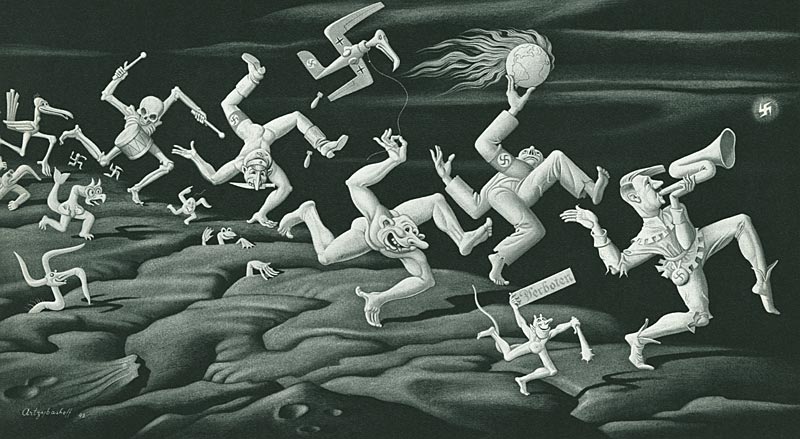
1922 Weimar: Munich is treated to another speech by the drummer of the Nationalist Right, Adolf Hitler.
As a foundation for a new currency, the property of those who are not our blood must do service. If families who have lived in Germany for a thousand years are now expropriated, we must do the same to the Jewish usurers. [For the full text, Click here.]
1922 Hitler pleads his case in an open letter to Count Lerchenfeld, the new Bavarian premier:
I admit that by the letter of our present Jewish law, I really am a 'foreigner.' I might argue, Your Lordship, that my birthplace is only two hundred and fifty yards from the Bavarian border, that it was Bavarian territory a hundred years ago, and, as I hope, will be returned to the German Reich in less time than that . . . . Blood is thicker than water, Your Lordship, and by blood I am not only proud to be a German, but even prouder that fortune permitted me to stake my blood for my Germanism. At that time, it would have been child's play for me, Your Lordship, to win citizenship. I neglected to do so, because I ventured to retain my unshakable hope in a greater Germany, and also my conviction that a day would come when a German's right to work with his people would not be judged by papers and certificates, Your Lordship, but exclusively by his blood and by his worth.
[For further details, Click here.]1923 During a speech at the Circus Krone, Hitler responds to rumors that "the Reds" will be celebrating the upcoming May Day, heavily armed: "I am announcing that we will ruthlessly protect every meeting with weapons." This declaration is met by "roaring applause" from the audience. In the body of the speech, Hitler comes out for compulsory military conscription:
THEREFORE WE NATIONAL SOCIALISTS STAND FOR COMPULSORY MILITARY SERVICE FOR EVERY MAN. If a State is not worth that—then away with it! Then you must not complain if you are enslaved. But if you believe that you must be free, then you must learn to recognize that no one gives you freedom save only your own sword. What our people needs is not leaders in Parliament, but those who are determined to carry through what they see to be right before God, before the world, and before their own consciences—and to carry that through, if need be, in the teeth of majorities. And if we succeed in raising such leaders from the body of our people, then around them once again, a nation will crystallize itself . . . . It is the pride of our Movement to be the force which shall awake the Germany of fighters which yet shall be. [For the full text, Click here.]
1927 Adolf Hitler informs the authorities in Linz that he wishes to renounce his Austrian citizenship. (See April 30) (Maser)
[See: Austria: The Other Germany.]1927 Otto Strasser's newspaper, the Berliner Arbeiterzeitung has been publishing a series of articles critical of Goebbels and his activities in Berlin. The latest article is entitled "The Results of Miscegenation". Written by Otto Strasser, the article uses a favorite tactic of Nazis when fighting other Nazis; calling the other guy a Jew. Goebbels' clubfoot, and his "repulsive ugliness," are sure signs that he is no pure Aryan, the article proclaims. Goebbels appeals to Hitler, but while his Fuehrer nods sympathetically, he refuses to intercede. However, he approves Goebbels' request to start up a new Berlin party newspaper, from which to fight the Strassers.
[For further details, Click here.]
1927 Hitler delivers the third of four speeches to a closed meeting of conservative business leaders in Essen, on the subject "Leader and Mass." Among those in attendance is the eighty-four year old Emil Kirdorf (above), "the Bismarck of coal," but he and Hitler do not meet face-to-face on this occasion. On hand for the meeting is a large contingent from the Stahlhelm veterans' organization.
1933 Julius Streicher speaks to the newly-Nazified Nuremberg City Council:
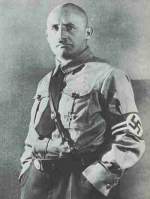
German racial comrades! In 1918, the state collapsed in Germany, leading to a complete dissolution of the German people in all areas of life. Respect for the holy, the inheritance of centuries, vanished under the mocking laughter of a misled "mass man." People did not want to accept that there was a fatherland named Germany. The rootless spirit, the rootless god of an abstract Internationale ruined the source from which the German people had always taken its strength in time of need. The German people lost faith in the strength of its blood, its faith in the strength of its soul, and thus faith in its very self. Thus it had to come that the inward and outward strength, the former power, the glory of the past, sank into shame and misery. But the most terrible aspect of these fourteen years was not that the economy of the productive German people was ruined. Rather, the German people's faith in itself was taken away the faith in that which once holy to its fathers. That was the crime against the German people. [For the full text, Click here.]
1938 Palestine: The Woodhead Commission arrives to study the Peel Commission's partition plan.
1939 United Kingdom: Conscription: The House of Commons votes to conscript men of 20 for military service. Prime Minister Neville Chamberlain declares that it is a departure from cherished traditions, but vital to send the right message to Herr Hitler. Conscripts face six months of intensive training before transfer to the Territorials.
1941 World War II: Greece: German tanks roll into Athens: The King of Greece and the Government have already fled to Crete. Churchill, in a 'Report on the War' radio speech, reviews recent events and reasserts the importance of the battle of the Atlantic:
You will remember how, in November, the Italian dictator fell upon the unoffending Greeks and without reason and without warning invaded their country, and how the Greek nation, reviving their classic frame, hurled his armies back at the double-quick. Meanwhile, Hitler, who had been creeping and worming his way steadily forward, doping and poisoning and pinioning one after the other, Hungary, Rumania and Bulgaria, suddenly made it clear that he would come to the rescue of his fellow-criminal. The lack of unity among the Balkan States had enabled him to build up a mighty army in their midst. While nearly all the Greek troops were busy beating the Italians the tremendous German military machine suddenly towered up on their other frontier. In their mortal peril the Greeks turned to us for succour. Strained as were our resources we could not say them nay. By solemn guarantee, given before the war, Great Britain had promised them her help. They declared they would fight for their native soil even if neither of their neighbours made common cause with them and even if we left them to their fate. But we could not do that. There are rules against that kind of thing and to break those rules would be fatal to the honour of the British Empire, without which we could neither hope nor deserve to win this hard war. Military defeat or miscalculation can be remedied. The fortunes of war are fickle and changing. But an act of shame would deprive us of the respect which we now enjoy throughout the world and thus would sap the vitals of' our strength. During the last year we have gained by our bearing and conduct a potent hold upon the sentiments of the people of the United States. Never, never in our long history have we been held in such admiration and regard across the Atlantic Ocean. In that Great Republic, now in much travail and stress of soul, it is customary to use all the many valid, solid arguments about American interests and American safety which depend on the destruction of Hitler and his foul gang and even fouler doctrine. But, in the long run-believe me for I know-the action of the United States will be dictated not by methodical calculations of profit and loss but by moral sentiment. [For the full text, Click here.]
1942 World War II: Various:
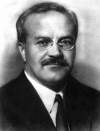
From a note by V. M. Molotov: People's Commissar for Foreign Affairs of the USSR:
By direct order of its High Command the German fascist Army has subjected Soviet towns and villages to unparalleled devastation upon seizure and in the course of the army's occupation . . . . The special detachments set up by the German Command for the purpose of setting fire to Soviet populated centers and for the mass extermination of the civilian population during the retreat of the Hitlerite Army, are perpetrating their sanguinary deeds with the cold-bloodedness of professional criminals. Thus, for instance before their retreat from the village of Bolshekrepinskaya, Rostov region, the Germans sent down the streets of the village special flame-throwing machines which burned 1,167 buildings, one after the other. The large, flourishing village was turned into flaming bonfires which consumed the dwellings, the hospital, the school, and various other public buildings. At the same time machine gunners, without any warning, shot at inhabitants who approached their burning houses; some of the residents were bound, sprayed with gasoline and thrown into the burning buildings . . . .
In their insane fury against the Soviet people, which was caused by defeats suffered at the front, the commanding general of the 2d German Panzer Army, General Schmidt, and the commander of the Orel administrative region and military commander of that city, Major General Hamann, had created special demolition commandos for the destruction of towns, villages, and collective farms of the Orel region. These commandos, plunderers, and arsonists destroyed everything in the path of their retreat. They destroyed cultural monuments and works of art of the Russian people, burned down cities, towns, and villages.
German Anthropology: In his "Comments on the General Plan for the East," a plan formulated by the SS, Dr. Wetzel mentions the anthropological investigation, supported by the DFG, and conducted by Professor Abel (a department head at the KWI of Anthropology), involving Soviet citizens in German prisoner-of-war camps: "He [Abel] gave a stern warning that the Russians should not be underrated . . . . In these circumstances, Abel saw only two possible solutions: either the extermination of the Russian people or a Germanization of its Nordic elements." (THP)
1943 Various:
From a letter signed by Plucks, SS Brigadefuehrer and Major General of the Waffen-SS:
The Reichsfuehrer SS and Chief of the German Police has decided after consultation, that in the future only mentally sick prisoners may be selected for action 14-F-13 by the medical commissions appointed for this purpose. All other prisoners incapable of working (tubercular cases, bedridden cripples, etc., are to be basically excepted from this action. Bedridden prisoners are to be drafted for suitable work which they can perform in bed. The order of the Reichsfuehrer SS is to be obeyed strictly in the future. Therefore, requests for fuel for this purpose are unnecessary.
Holocaust: Warsaw ghetto: From the SS and Police Fuehrer in the District of Warsaw to the Higher SS and Police Fuehrer East:
At 1600 hours a special battle group, 320 officers and men strong, started cleansing a large block of buildings situated on both sides of the so-called Niska Street in the Northeastern part of the former Ghetto. After the search the entire block was set on fire, after having been completely cordoned off. In this action a considerable number of Jews were caught. As before, they remained in-the dug-outs, which were either below the ground or in the lofts of the buildings until the end. They fired their arms to the last moment, and then jumped down into the street, sometimes from as far up as the fourth floor, having previously thrown down beds, mattresses, etc., but not until the flames made any other escape impossible. A total of 2,560 Jews were caught today within the former Ghetto, of whom 547 were shot. Moreover, Jews in a not ascertainable number perished when dug-outs were blown up, or in the flames. [For further details, Click here.]
1945 World War II: Various:
Holocaust: During a death march from Rehmsdorf, a satellite camp of Buchenwald, 1,000 prisoners are killed with machine-gun fire and grenades at Marienbad station. Another 1,200 are killed as the march continues toward Theresienstadt, where 500 are killed on arrival. (THP)
Churchill to Stalin:

I am extremely pleased to know that you had no doubt how I would act, and always will act, towards your glorious country and yourself. British and I am sure American action on this matter will go forward on the lines you approve, and we all three will continually keep each other fully informed.
Negotiations: OSS chief Allen Dulles is ordered by the US Joint Chiefs of Staff to resume negotiations with German 'peace' emissaries. Note: Waller says the 26th, Mosley the 27th. (Mosley, Waller)
[See: The Last Days of the Third Reich.]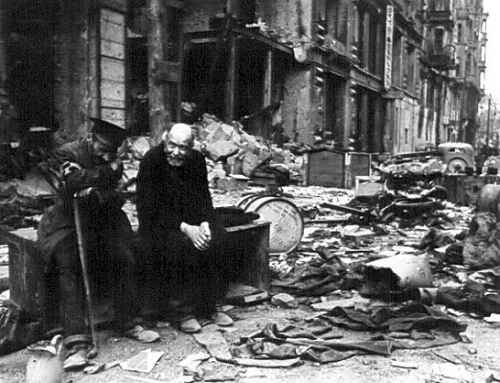
Battle of Berlin: An early morning situation conference in the Fuehrerbunker concentrates on Wenck's three battalion relief force just arriving at Potsdam. Giving up on hope that Busse's 9th Army can link up with Wenck, there still remains Holste's forces north-west of Berlin. Goebbels declares: "May God let Wenck come! A dreadful situation crosses my mind. Wenck is located at Potsdam, and here the Soviets are pressing on Potsdamer Platz!" Hitler replies: "And I'm not in Potsdam, but in Potsdamer Platz." One of the generals present voices reassurances: "Wenck will get here, Mein Fuehrer! It's only a question of whether he can do it alone." Hitler opines: "You've got to imagine. That'll spread like wildfire through the whole of Berlin when it's known: a German army has broken through in the west and established contact with the Citadel (Festung)." (Kershaw)
A Fuehrerbunker wedding celebration: One of the drivers marries Liesl Ostertag, one of the kitchen maids. A reception is held in Hitler's apartment for the couple (who had earlier offered to smuggle the Goebbels children out of the Bunker, only to be refused by Magda). (Sereny, Sigmund)

The Voelkischer Beobachter—newspaper of the Nazi Party, ceases publication.
Reminiscence: Goebbels asks his Fuehrer—while reminiscing about the good old days in the presence of a stenographer—why he had changed his mind in 1932 and decided to abandon his pursuit of the German Presidency for that of Chancellor.
Hitler: I was weaving my way from one compromise to another. This lasted until the death of Hindenburg. Previously, I thought I would expose ruthlessly people like (General) Hammerstein, Schleicher, and the whole clique around that dung heap. But after eighteen months this intention gradually became less firm. This was the time of the great work of construction. Otherwise, thousands would have been liquidated. Instead, we assimilated them.
Goebbels: It occurs to me that during March (1933), so many of these will-o-the-wisps entered the Party. There was a real frenzy for it. Because we were unwilling to take in these wretches, they asked us whether we had no desire for reconciliation. It would have been more correct if we had closed the Party and said: No more may enter.
Hitler: We could have done that if I had come to power as a result of a definite expression of the popular will or through a coup d'etat. Afterward, of course, one repents of being so goodhearted.
Goebbels: All the Austrian Gauleiters said at the time that there was a flaw in the revolution. It would have been much better if Vienna had resisted, and we could have shot the whole place to hell."
Hitler: I remain for the reason that I thereby have a greater moral right to act against weakness. Otherwise I do not have the moral right. I cannot continually threaten others if I myself run away from the capital of the Reich at the critical hour. We must introduce throughout the Wehrmacht a certain code of honor. A basic principle, always followed in the navy, must be taken over by the Party and be made binding on every member. In this city I have the right to give orders: now I must obey the commands of fate. Even if I could save myself, I would not. The captain goes down with his ship. (Payne)
[See: Why Did Hitler Insist on No Surrender?]Austria: The Second Republic is formed.
1976 Rock singer David Bowie is detained on a train trip from Russia to Poland after Nazi books and mementos are found in his luggage.

1987 Austrian Chancellor Kurt Waldheim is barred by the US Justice Department from entering the US, because of his collaboration with Nazi Germany during World War II.
1996 Death: William Colby: American director of the Central Intelligence Agency:
Colby volunteered for the Army in 1941 and served with the Office of Strategic Services during World War II, parachuting behind enemy lines twice. First, he deployed to France as a Jedburgh commanding Team BRUCE, in mid-August 1944, until overtaken by Allied forces later that Fall. His second clandestine mission was leading the NORSO Group into Norway on a sabotage mission. It was Colby who launched the Accelerated Pacification Campaign during the Vietnam War. He later would reveal a large amount of information to Congress. Colby died in a boating accident near his home in Rock Point, Maryland. The accident was highly suspicious and Kay Griggs, exwife of United States Marine Colonel George Griggs, continues to allege that Colby was murdered. Colby's body was eventually found, underwater, on May 6, 1996. The life jacket his friends said he usually wore was ironically missing. The body was found approximately 20 yards from the canoe, after the area had been thoroughly searched multiple times. The subsequent inquest found that he died from drowning and hypothermia after collapsing from a heart attack or stroke and falling out of his canoe. The investigation was closed.
Edited by Levi Bookin (Copy editor)
levi.bookin@gmail.com



Click to join 3rdReichStudies

Please note that the list-owner and the moderator are not responsible for, and do not necessarily approve of, the random ads placed on our pages by our web server. They are, unfortunately, the price one pays for a 'free' website.
FAIR USE NOTICE: This site may contain copyrighted material the use of which has not always been specifically authorized by the copyright owner. We are making such material available in our efforts to advance understanding of historical, political, human rights, economic, democracy, scientific, environmental, and social justice issues, etc. We believe this constitutes a 'fair use' of any such copyrighted material as provided for in section 107 of the US Copyright Law. In accordance with Title 17 U.S.C. Section 107, the material on this site is distributed without profit to those who have expressed a prior interest in receiving the included information for research and educational purposes. If you wish to use copyrighted material from this site for purposes of your own that go beyond 'fair use', you must obtain permission from the copyright owner.